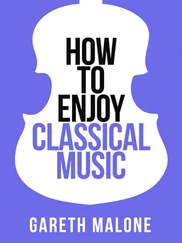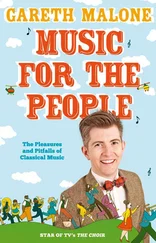STEPHEN FRY - OF CLASSICAL MUSIC
Здесь есть возможность читать онлайн «STEPHEN FRY - OF CLASSICAL MUSIC» весь текст электронной книги совершенно бесплатно (целиком полную версию без сокращений). В некоторых случаях можно слушать аудио, скачать через торрент в формате fb2 и присутствует краткое содержание. Жанр: на английском языке. Описание произведения, (предисловие) а так же отзывы посетителей доступны на портале библиотеки ЛибКат.
- Название:OF CLASSICAL MUSIC
- Автор:
- Жанр:
- Год:неизвестен
- ISBN:нет данных
- Рейтинг книги:5 / 5. Голосов: 1
-
Избранное:Добавить в избранное
- Отзывы:
-
Ваша оценка:
- 100
- 1
- 2
- 3
- 4
- 5
OF CLASSICAL MUSIC: краткое содержание, описание и аннотация
Предлагаем к чтению аннотацию, описание, краткое содержание или предисловие (зависит от того, что написал сам автор книги «OF CLASSICAL MUSIC»). Если вы не нашли необходимую информацию о книге — напишите в комментариях, мы постараемся отыскать её.
OF CLASSICAL MUSIC — читать онлайн бесплатно полную книгу (весь текст) целиком
Ниже представлен текст книги, разбитый по страницам. Система сохранения места последней прочитанной страницы, позволяет с удобством читать онлайн бесплатно книгу «OF CLASSICAL MUSIC», без необходимости каждый раз заново искать на чём Вы остановились. Поставьте закладку, и сможете в любой момент перейти на страницу, на которой закончили чтение.
Интервал:
Закладка:
So, if it was the age of the Grand Tour, what music might have beguiled you had you ventured to Italy? Well, one man you might have come across if you'd got the right room with the right view was Albinoni.
SO THE OLD ADAGIO GOES
he Venetian Tomaso Albinoni, despite his many good works, was destined to become not even a one-hit wonder. Like many composers, he would often be working on several pieces at once -whether operas with Metastasio, the Tim Rice of his day, or symphonies, a form in which he was reputed to have been quite a pioneer. Sometimes, he would simply write down an idea, or part of an idea, with maybe only the odd part sketched in, the intention being that he would leave it aside to return to another day. It was one such 'sketch', a mere fragment of manuscript, which the Italian scholar Remo Giazotto found in 1945, lining his wastepaper basket. It had fi That is, 'before he croaked', and 'under a pseudonym'. Not 'before he croaked under a pseudonym', if you understand me? Just wanted to make that clear. In fact, as far as I'm concerned, Tsar Peter never, to the best of my knowledge, croaked under a pseudonym. Good. Glad to clear that up. fi fi Translation: 'My mum went to Venice and all I got was this lousy painting.' only a handful of notes scribbled in on the violin part, and some but not all of the bass part. With a little bit of guesswork and a prevailing wind, he came up with what is now known as 'the Albinoni Adagio' -despite the fact that Albinoni hadn't actually written it.
Being an 'adagio' - the Italian word meaning 'at a slow pace' - it is an unhurried and simple string tune, punctuated by a soft, often reedy organ sound. As a result of its hybrid composition, it is more romantic than most baroque pieces of its type. So when you listen to it next time, think of Albinoni and his sketches; think of Remo Giazotto, going largely unremembered; but most of all, think of Canaletto, painting the sun setting over Venice, the lap, lap, lapping of the weedy canals, the cumbersome clunk of paint-peeling gondolas. Beautiful. Deliquescent. And, before we go any further, let me answer the question I posed earlier, on page 61. Simple. Just like me, they long to be… close to you. There. I think that's covered everything.
DON'T FORGET NATHAN THE PROPHET!
R
ight. Where are Bach and Handel? Well, they're still dominant, to be fair. Bach was coming up with stuff like the St John Passion and the St Matthew Passion - more of which later - whereas Handel, well, he managed the opera Rodelinda (from which we get the gorgeous aria 'Dove sei') and even Zadok the Priest (not forgetting Nathan the Prophet - more on this later too). Each a sort of separate leg of the… compositional Colossus, bestriding the… harbour that is… well, that is music. As it were. OK, needs work. But where is music at, as they would have said in the '70s? Where is it all at? Where is it all jjoingi Well, it's more or less doing what everyone else is doing - it's going on a Grand Tour. Let me try and explain, before you send someone to sit with me.
Here's what I mean. Imagine you are music in general, right? Well, behind you… is home - that is, Church music. Like home, it will always be there, but for now, well… we're off exploring. The journey has already taken in opera, which has reached its first peak and is already on the wane. Its time will come again, but not for years. For now, instrumental music is King, and its kingdom is Italy.
In terms of instrumental music, overtures came first - a band playing as one. Then the band split - two separate sections of the same band, almost like teams, playing against each other. This 'two-team' formation was called the concerto. Then, one of the groups became smaller. So now it's a small bunch of soloists versus the rest of the band - or the concerto grosso - the great concerto.
Try and look at it like this. Imagine each j is a player in the orchestra. In an overture, the orchestra was like this: ffifTiliTtfiittflT tmmwmtm! ififfifflfffTftm All together, see? Then the orchestra split: ttttfttft tftfffttf ttttttttt ttttttttt ttttttttt ttttttttt
… to play a concerto. Then, one side became smaller than the other: ft ttffffffftffffffft i* ttWttftfWWMM TftttftffftftTffff
… to play the concerto grosso.
The Italian Corelli was big on these 'concern grossi', as were lesser-known names like Geminiani and Torelli, as well as Handel himself. From here, it's not a huge leap to the 'solo concerto': t ttttttttttttttttttttttttttt ttttttttttttttttttttttttttt ttttttttttttttttttttttttttt
…just one player versus all the rest, and by far the most popular version. The one we're most familiar with now, to be honest. Vivaldi did virtually all he could with this format - one or 400, depending whether you agree with Stravinsky or not.
With the concerto, came - rather obvious, really, but it has to be said - The Soloist. And, presumably, with the soloist came, what… luwie fits and outrageous dressing room demands. Good. Just what we need. 'I want a bowl of M amp;Ms with all the blue ones taken out… oh, and a music stand.'
Technology-wise, the organ is the big thing, but other new instruments are coming online all the time - not just the piano I mentioned earlier, but the piccolo (the funny sort of dwarf castrato flute, as it were), the clarinet too, and, oddly enough, the tuning fork.-"
TOCCATA AND FEUD
? ? what's bubbling in 1729? Who is damned? Who is faintly praised? The South Sea Bubble is well and truly burst, Catherine the Great has succeeded Peter the Great - nice to see she took his name - and Moll Flanders is still one of the public's favourite books, some seven years after its release. You can possibly see why. Handel, himself, has relinquished his right to be first to the deckchairs by becoming a British citizen. Bach, of course, still hasn't left Germany, although he has now moved pretty far afield for him: down the road fl The tuning fork, incidentally, was invented by a brass player. If anyone was going to feel the need for an implement to keep you in tune, it's not surprising that it was a brass player. to Leipzig.
Johann Sebastian is in a bit of a feud situation with the Church authorities, not helped, no doubt, by the fact that he was the last choice for the Leipzig job. He was less preferred than the exceedingly dull Telemann, and even less preferred to the exceedingly unknown Graupner. Who he? Ed. (In fact, who Ed?) Bach found himself in trouble with his employers on more than one occasion, and I think, to look at it fairly, there was right and wrong on both sides. Bach's jobs were ridiculously labour-intensive, with music to write and arrange for so many different places and events. But, equally, he could, by all accounts, be a bit tough to get on with. On one occasion, he applied for a new job and got it, neglecting to tell his new employer only one vital fact - he already had a job, and they didn't want to let him go. He ended up being placed under house arrest to prevent him skipping to his next gig.
The good thing, though, is that all Bach's wrangling with the powers-that-be does not appear to have affected his writing. A stream of great works just seem to pour forth from him like sweat from a mere mortal. One of them is the marvellous St Matthew Passion, in which Bach used not only the St Matthew version of the Passion but also the odd extra verse written by a man writing under the name of Picander, who was in fact a postman from Leipzig. As you can imagine, a man as committed to the Church as Bach would have put all his resources into a dramatic setting of the crucifixion and resurrection of Christ. The 'oratorio Passion' was a particularly German affair, having grown out of the liturgical Lutheran Passion music, pioneered by early musical setders such as Schiitz/
Читать дальшеИнтервал:
Закладка:
Похожие книги на «OF CLASSICAL MUSIC»
Представляем Вашему вниманию похожие книги на «OF CLASSICAL MUSIC» списком для выбора. Мы отобрали схожую по названию и смыслу литературу в надежде предоставить читателям больше вариантов отыскать новые, интересные, ещё непрочитанные произведения.
Обсуждение, отзывы о книге «OF CLASSICAL MUSIC» и просто собственные мнения читателей. Оставьте ваши комментарии, напишите, что Вы думаете о произведении, его смысле или главных героях. Укажите что конкретно понравилось, а что нет, и почему Вы так считаете.










